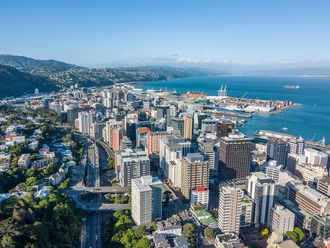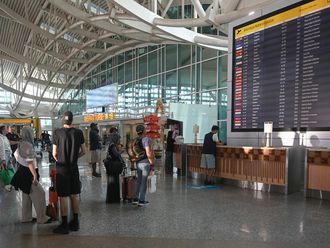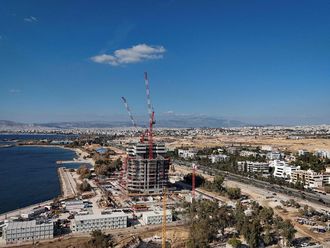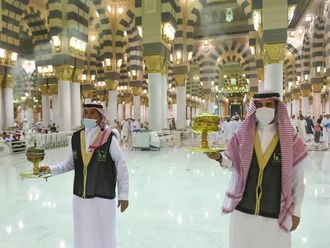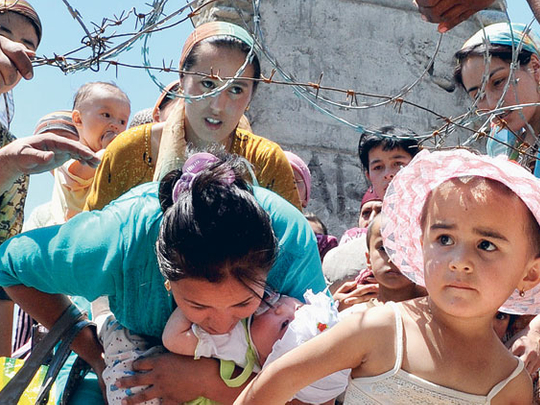
Osh: Kyrgyzstan's interim president yesterday said that 2,000 people may have died in the ethnic clashes that have rocked the country's south — many times her government's official estimate — as she made her first visit to a riot-hit city since the unrest erupted.
Kyrgyz Health Ministry official figures have put the number of killed in rampages led mainly by ethnic Kyrgyz against Uzbeks at 191.
"I would increase by 10 times the official data on the number of people killed," Interim President Roza Otunbayeva said, according to her spokesman, Farid Niyazov. She said current figures don't take into account those buried before sundown on the day of death in keeping with Muslim tradition, according to the spokesman.
The United Nations said that as many as one million people may eventually need aid in Kyrgyzstan and Uzbekistan, including the refugees, internally displaced, host families and others who may suffer from the unrest.
Unicef spokeswoman Christiane Berthiaume said the figure was an estimate to help aid agencies plan. She says the actual number of people in need may turn out to be higher or lower.
The aid agencies say those uprooted by the unrest most urgently need food, water, medicine and shelter.
The UN's aid airlift into Kyrgyzstan was scheduled to begin this weekend. Two chartered Ilyushin-76 cargo planes carrying 80 tonnes of relief items are expected to arrive in Osh.
Meanwhile, the sixth flight into Uzbekistan was expected to land at Andijan, Uzbekistan, later yesterday, completing the initial load of some 240 tonnes of relief supplies.
Otunbayeva arrived yesterday by helicopter in the central square of Osh, a city of 250,000 where the violence began last week. Parts of the city have been reduced to rubble by mobs of young Kyrgyz men who burned down Uzbek homes and attacked Uzbek businesses.
The United Nations estimates that 400,000 people fled the country's south.
"We have to give hope that we shall restore the city, return all the refugees and create all the conditions for that," Otunbayeva said. She said good will between ethnic Kyrgyz and Uzbeks would end hostilities.
Up to 100,000 people have crossed the border into Uzbekistan, where they are getting food and water in camps. Thousands more remain camped in squalid conditions on the Kyrgyz side of the border, unable to cross due to Uzbek restrictions. Over the past few days, Uzbek border guards have placed quilted blankets over barbed wire at the border to allow refugees in Uzbekistan to return.
Migration official Alik Bayboriyev told the AP that there were 31,800 refugees on the Kyrgyz side of the border near Jalal-Abad, a hard-hit town near Osh.
US Assistant Secretary of State Robert Blake, visiting a refugee camp in Uzbekistan 5km from the Kyrgyz border, said he was working to ensure the refugees would be able to return home safely.
Blake was swamped by crying refugees, mainly older women and children, complaining they were desperate to return home but too fearful to do so.
"We ... believe there should be an investigation," he said. "We are working with the government of Kyrgyzstan to provide security so you can return home safely."
Blake asked the refugees if they thought the violence had been organised, as the United Nations and Kyrgyz authorities have suggested.
"Yes, of course it was organised, it all happened so unexpectedly," answered one refugee, Nasiba Mamyrdzhanova, from Osh.
In a sign that tensions remain high, hundreds of ethnic Uighurs have fled communities in the capital, Bishkek, after receiving threats that they would be the next targets of violence.
As many as 70,000 Uighurs, a Turkic people with a significant presence in Central Asia and into China's far western regions, live in or near Bishkek. Most have fled for Kazakhstan, where many have relatives, the vice president of the country's Uighur community, Zhamaldin Nasyrov, said.
He said unidentified people have visited the communities in SUVs, writing ominous warnings on houses and fences.


